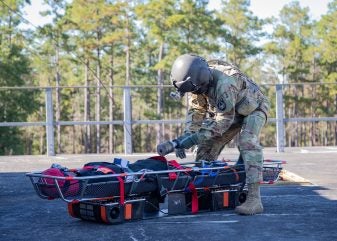
Airforce Technology interviewed Caleb Carr, CEO of Vita Inclinata, who says he was propelled to found his company after a friend of his died under a UH-60 Blackhawk due to the swing of a rescue litter on a search and rescue mission.
Vita Inclinata currently train and equip around 90% of the US medivac fleet, both civilian and military. Its flagship product, the VA Rescue system, attaches a series of fans directly to the suspended load, providing counter-thrust in a direction of motion or swing, enabling it to bring a load immediately to rest.
However, Carr contends that under the funding programmes for defence equipment that have rolled out since the beginning of the war in Ukraine, manufacturers of newer technology are unable to find a foothold in the procurement process.
The aerial drone stabilised cradle can reduce the duration of an extraction medivac mission from 20 minutes down to just two or three minutes. “Which, naturally, from a helicopter operations perspective, is pretty significant,” says Carr.
While the VA Rescue systems is described as a stabilisation device for aircraft to do precision hoisting, the adapted cradle can also fly underneath the helicopter to reach personnel in rescue areas in difficult locations, such as a boat on high waters or cliff-face.
The reduction in mission duration opens wide the possibility for more and more-frequent medivac operations, in austere environments and against difficult weather conditions, giving

US Tariffs are shifting - will you react or anticipate?
Don’t let policy changes catch you off guard. Stay proactive with real-time data and expert analysis.
By GlobalDatamilitaries an incentive to expand to expand their search and rescue fleets and take advantage of the new possibilities.
When Carr visited Ukraine, six weeks into the conflict, the company supplied Ukrainian forces with a rescue helicopter capability. As an essential asset to the war effort, Ukraine promptly requested an additional 30 assets, as well as a number of aircraft, according to Carr, with a formal request submitted as a letter.
Unfortunately, as a new technology, there is no US government stockpile of the VA Rescue System. The US Army has only 15 of the systems operational currently. While Vita Inclinata and Ukraine are willing to engage in the provision of systems, under the presidential drawdown system there is not a mechanism for the US to support the provision.
Carr sees this as a far reaching issue, where only high-value assets are being supplied to Ukraine, and lower cost, but highly effective and desirable systems are not put into service where they can be useful.
“You have real time tools, whether that’s the Vita rescue system, drones, etc, all things that we’re hearing about right. But the only things that the US Government has are the really expensive MQ-9s, the Abrams tanks, the artillery shells, etc, right?”, says Carr.
“They’re not made by small business, at all. You might have small business suppliers. But that’s it. As a result of that, all these drawdowns are pulling from us stockpiles, but in the net result, you then are basically taking all those appropriated funds and just buying new stockpiles from the OEMs. And so it’s just another way to create that cycle.
“There’s no tools, right now, for small businesses to be able to plug into it.”
Collectively, over $30m in funds have been appropriated for litter stabilisation systems by the US Congress, and Vita Inclinata works through those individual appropriations programmes to supply the Army and Air Force. As an international supplier, the company also supports militaries overseas on an ad hoc basis, with varied appropriation procedures for different nations, including UAE, Sweden, Brazil, and Portugal.
“We have found two very distinct kind of procurement models. One, in the US government, which is very cyclical and generally happens on an annual basis. Whereas then this like the UAE government, which is much more quick to make decisions, but very analytical in their decision making,” said Carr. He described the process of moving between different markets as one involving a certain amount of agility, in order to operate.
The solution Carr proposes to the headwinds he experiences as the CCEO of an SME, is one learned, not from his companies experiences in international trade, but instead from witnessing the collective repose of business in the US and Europe to the Covid pandemic. He saw small business energised to solve a pressing problem, manufacturing PPE and ventilators through every available enterprise, and believes that replicating aspects of this approach can help to liberate the potential of business like Vita Inclinata.
“The US government needs to say, ‘Instead of us using existing stockpiles, anybody that can support these particular needs, tell me when you can deliver it.’ Just like we did in the Covid pandemic. ‘If we give you a contract, we’re going to hold you to it. And if you miss the mark, you’re disqualified from any further contracts.’”
Carr is well aware that the strength of the current system for supplemental bills of military support to Ukraine lays with the knock-on effect for the US military. Passing on older systems to Ukraine provides room for the United States to upgrade its own military with newer assets, and strips it of the burden of simultaneously maintaining older systems.
“The reality is, what we see in both the wars in Israel and also in Ukraine, is that people are fighting in a radically different way. And unless you create a vehicle to be able to take up small business, and more importantly the kind of these novel technologies, you’re completely doing both countries a disservice,” concludes Carr.



